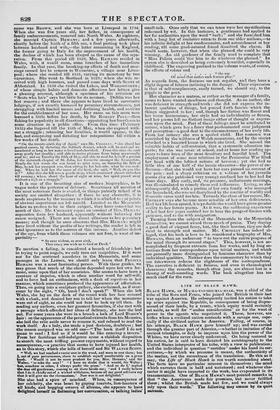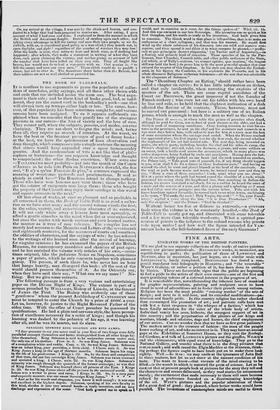LIFE OF BLACK HAWK.
BLACK HAWK, Or MA-KA.-TAI-SFIE-KIA-KIAK, was a chief of the tribe of the Sacs and Foxes, who joined the British in their last war against America. He subsequently incited his nation to take up arms against the Republic, in consequence of being dispos- sessed of their lands, by a treaty, which equity would certainly set aside, as well for "undue consideration" as for the want of power in the agents who negotiated it. These, however, are trifles when a civilized nation contends with a savage one, espe- cially if the civilized nation be America. Failing, of course, in his attempt, BLACK HAWK gave himself up; and was carried through the greater part of America,—whether in imitation of the ancient triumphs, or duly to impress upon him the power of the Whites, we have never clearly understood. On being restored to his nation, he is said to have dictated his autobiography to the United States interpreter of his tribe, with a view to publication; and the individual in question "certifies" under his hand its cor- rectness,—by which we presume is meant, the authenticity of the matter, not the correctness of the translation. Be this as it may, the Life of Black Hawk is not worth contending about. The facts have no particular interest in themselves ; the mind which narrates them is bald and untutored ; and whatever cha- racter it might have imparted to the work, has evaporated in its transmutation. One of BLACK HAWK'S most pointed remarks is, that " the Americans made fair promises, but never fulfilled them ; whilst the British made but few, and we could always rely upon their words." The following may amuse by its quiet sarcasm. On my arrival at the village, I was ,net by the chiefs and braves, and con- ducted to a lodge that had been prepared to receive me. A fter eating, I gave account of what I bad seen and done. I explained to them the manner in which the British and Americans fought. Instead of stealing upon each other, and taking every advantage to kill the enemy and save their own people, as we do, (which, with us, is considered good policy in a war-chief,) they march out, in open daylight, and fight ! regardless of the number of warriors they may lose! After the battle is over, they retire to feast and drink wine, as if nothing had happened ; after which, they make a statement in writing of what they have done, each party claiming the victory, and neither giving an account of half the number that have been killed on their own side. They all fought like braves, but would not do to lead a war-party with us. Our maxim is, " to kill the enemy and save our own men." Those chiefs would do to paddle a canoe, but not to steer it. The Americans shoot better than de; British, but their soldiers are not so well clothed or provided for.



























 Previous page
Previous page